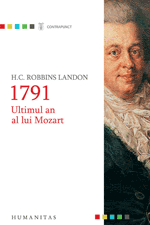> [Archived] Interviews

Book releases at Humanitas
'Schubert's life'
The book about Schubert is signed by Christopher Gibbs, who, beside the fact that he is an expert on Schubert's music, he is the one who initiated, in New York, the 'Schubertiade'. Christopher Gibbs provides a realistic image about Schubert. Recently, he has been portrayed as a dark composer, marked by illness, suffering and the interesting part is that Schubert was not like that, and Gibbs tries to get us close to the real Schubert. Plus, his book has an interesting part- the relationship between Schubert and Beethoven. We actually do not know if Schubert had ever met Beethoven. These are contradictory facts of the contemporaries, but Gibbs insists on Beethoven's influence on Schubert.
'1791- The last year of Mozart's life'
The book about Mozart... It is the book written by the greatest expert on Mozart, Robbins Landon, who also answers the cliché with which we got used to when talking about Mozart- that Mozart given to us by Schaeffer in 'Amadeus' and then popularized by Milos Forman, the baffled composer. It seems Mozart was not like that at all! Landon shows us that Mozart knew very well the rules of the musical game and he did not win as little as is rumoured. He begins with a chapter about the currency of the Austrian Empire and makes some estimation about how much Haydn and Mozart used to earn- and we see that Mozart did not earn little!
Then Landon points out two dark aspects, two speculations which were made.
One is about Mozart's 'Requiem' and the conditions in which he composed it. It has been known for a while that there was a countWalsegg who composed music and he wanted to take the works of other composers as his own. He is the one who ordered the 'Requiem' from Mozart. And in the book there is a confession of one of the persons who worked for count Walsegg.
The second interesting thing - which is solely the contribution of Robbins Landon - is clearing the speculations about the freemasonry, through the 'Magic Flute'. It is said that Mozart was killed by members of the freemasonry because he revealed a freemason ritual through this work which points explicitly to masonry.
Landon, studying the details of an age- maybe that is the first quality of the book, the fact that it presents Mozart in his age- shows that masonry was in a difficult situation at the end of Joseph's II reign, and it is not absurd to think that Mozart, together with Schikaneder ( the Czech librettist who performed in the premiere, in the role of Papageno, and the theatre's director where'The magic Flute'was performed) may have written'The magic flute' ,the two of them being part of the masonry, at the members' of the masonry request.
Masonry was semi-legal in 1791 and it is possible that this work was masonry propaganda. The idea that Mozart was killed by the masonry was dismissed by Robbins Landon because, on one hand, was the problem that, if Mozart was punished because of in the 'Magic Flute' revealing masonry rituals, Schikaneder also should have been killed, but he lived for a long time; then, the members of the masonry who organized a very festive funeral for Mozart, which wouldn't have been the case if Mozart had become a persona non grata for the masonry.»
Translated by Elena Enache and Laura Bosnea
MTTLC, Bucharest University














